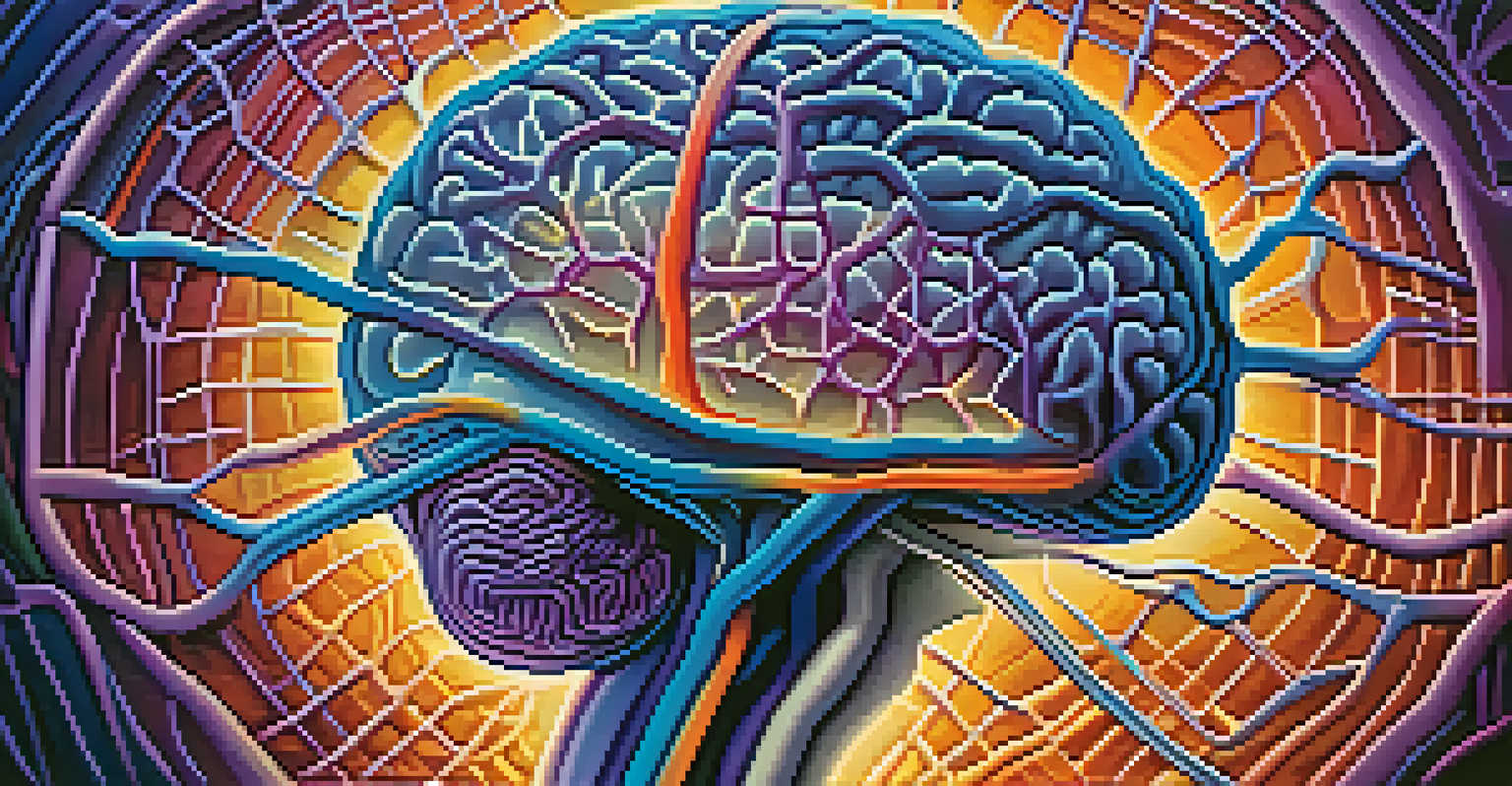Future Trends in Psychedelic Therapy for Chronic Pain Management

Understanding Chronic Pain: A Growing Epidemic
Chronic pain affects millions globally, often leading to debilitating conditions that can severely impact one's quality of life. Unlike acute pain, which is a direct response to injury, chronic pain persists long after the initial cause has healed. This ongoing discomfort can result in emotional distress, impacting mental health and overall well-being.
The mind is everything. What you think you become.
Traditional pain management methods, such as opioids and over-the-counter medications, often fall short and can lead to dependency or other health issues. As a result, there's a growing interest in alternative treatments that can offer relief without the adverse side effects. One such promising avenue is psychedelic therapy, which has garnered attention for its potential to alleviate the burdens of chronic pain.
Understanding chronic pain is crucial as we explore innovative solutions. By recognizing the limitations of conventional treatments, we can better appreciate the potential of psychedelics in providing a new approach to pain management.
The Science Behind Psychedelics and Pain Relief
Psychedelics, such as psilocybin and MDMA, have shown remarkable potential in altering perceptions and emotional responses. Research suggests that these substances can help reset neural pathways associated with pain perception, leading to lasting relief. This neuroplasticity, or the brain's ability to reorganize itself, opens doors to understanding how psychedelics can aid in treating chronic pain.

Studies indicate that psychedelics can also promote emotional healing by addressing underlying psychological issues that often accompany chronic pain, such as anxiety or depression. By fostering a sense of connection and empathy, these therapies can enhance overall well-being and pain management. The combination of psychological and physical relief makes psychedelics a compelling subject for further exploration.
Chronic Pain Affects Millions
Chronic pain is a widespread issue that severely impacts the quality of life for millions globally.
Understanding the scientific underpinnings of psychedelics helps demystify their role in pain management. With ongoing research, we are uncovering their potential to offer a holistic approach that targets both the mind and body.
Recent Clinical Trials and Their Findings
Recent clinical trials have started to shed light on the effectiveness of psychedelic therapy for chronic pain. For instance, studies administering psilocybin have reported significant reductions in pain levels and improved emotional states among participants. These promising results suggest that psychedelics could revolutionize how we approach chronic pain treatment.
Pain is inevitable. Suffering is optional.
Moreover, MDMA-assisted therapy has shown potential in addressing trauma-related pain conditions, highlighting the importance of mental health in pain management. Participants often report a profound sense of relief and a renewed perspective on their pain, demonstrating the interconnectedness of mind and body. Such findings are paving the way for more comprehensive treatment models.
As more clinical trials emerge, we are gaining valuable insights into the therapeutic potential of psychedelics. This growing body of evidence is crucial for legitimizing these treatments within the medical community.
The Role of Set and Setting in Psychedelic Therapy
In psychedelic therapy, the concepts of 'set' (the individual's mindset) and 'setting' (the environment) are vital for achieving positive outcomes. A supportive, controlled environment can significantly enhance the therapeutic experience, helping patients feel safe and open during their sessions. This aspect underscores the importance of professional guidance in these treatments.
A well-structured setting can help mitigate potential anxiety or fear that might arise during a psychedelic experience. By creating a nurturing atmosphere, therapists can facilitate deeper emotional exploration, which is essential for addressing the root causes of chronic pain. This layered approach is key to maximizing the benefits of psychedelic therapy.
Psychedelics Show Promise for Relief
Recent studies indicate that psychedelic therapy can effectively alleviate chronic pain and improve emotional well-being.
Understanding the impact of set and setting helps frame the therapeutic landscape of psychedelics. It emphasizes the need for careful planning and professional support to ensure the best possible outcomes for patients.
Legislation and the Future of Psychedelic Therapy
As research into psychedelic therapy progresses, so too does the conversation around legislation. Many regions are beginning to reconsider their stance on psychedelics, moving toward decriminalization and medical use. This shift opens up opportunities for more patients to access these innovative treatments for chronic pain.
However, the path to legalizing psychedelic therapy is complex and varies significantly across different jurisdictions. Advocacy efforts are crucial in raising awareness and pushing for policy changes that support research and accessibility. The growing body of evidence will likely play a pivotal role in shaping future legislation.
The evolving legal landscape surrounding psychedelics is poised to impact countless individuals seeking pain relief. By fostering open discussions about their therapeutic potential, we can work toward a future where these treatments are safely and effectively integrated into pain management strategies.
Integrating Psychedelic Therapy into Existing Pain Management
Integrating psychedelic therapy into existing pain management protocols presents both opportunities and challenges. Healthcare professionals will need to navigate the complexities of combining traditional methods with psychedelic treatments. This integration requires collaboration among various disciplines, including psychology, psychiatry, and pain management.
Developing comprehensive treatment plans that include psychedelics can enhance patient outcomes. By tailoring approaches to individual needs, practitioners can provide a holistic solution that addresses both physical and emotional aspects of chronic pain. Education and training for healthcare providers will be crucial in ensuring safe and effective use of these therapies.
Integration Requires Careful Planning
Successfully incorporating psychedelic therapy into existing pain management requires collaboration and tailored treatment approaches.
As we look toward the future, the integration of psychedelic therapy into pain management could redefine how we treat chronic pain. A collaborative, patient-centered approach will be essential in realizing the full potential of these groundbreaking treatments.
Challenges and Considerations in Psychedelic Therapy
Despite the promising potential of psychedelic therapy, several challenges remain. Stigma surrounding psychedelics can create barriers to acceptance and access, affecting both patients and healthcare providers. Overcoming this stigma is crucial for facilitating open conversations about these therapies and their benefits.
Additionally, the variability in individual responses to psychedelics presents a challenge for standardizing treatment protocols. Each person's journey is unique, requiring tailored approaches that consider their specific circumstances and history. Ongoing research and clinical experiences are essential to navigate these complexities effectively.

Addressing these challenges is vital in advancing psychedelic therapy for chronic pain management. By fostering understanding and collaboration, we can work toward a future where these innovative treatments are widely accepted and utilized.